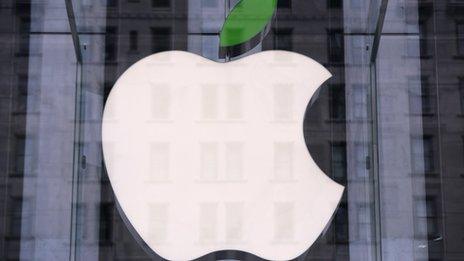Apple takes on Dropbox and WhatsApp with integrated apps
- Published
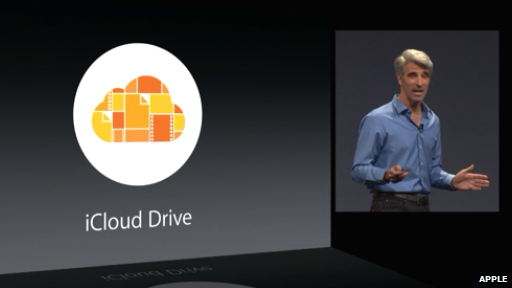
The iCloud service could pose a challenge to Dropbox and other online storage providers
Apple has taken on Dropbox and WhatsApp with a series of software upgrades that mimic the rival apps' services.
At its annual conference for software developers, the firm unveiled iCloud Drive, an internet-based storage app, which works on Apple systems and PCs.
In an effort to keep customers using all its technologies, Apple improved integration for calls and messages across its devices.
It also unveiled new mobile and desktop operating systems.
Apple's iMessage app was given extra features, some of which are similar to rival service WhatsApp, recently acquired by Facebook for $19bn (£11.3bn).
Users will be able to easily create and modify group messages, send voice clips with a single swipe, and even create and exchange short video clips.
The ability to send and receive text messages across all Apple devices was also introduced.
Jan Koum, WhatsApp's co-founder, reacted to Apple's announcement by tweeting:
"Very flattering to see Apple "borrow" numerous WhatsApp features into iMessage in iOS 8 #innovation"
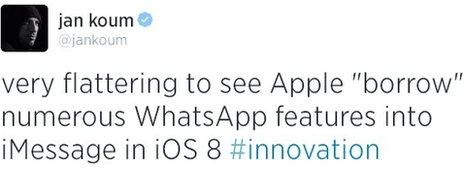
WhatsApp's co-founder posted a sarcastic tweet about Apple's news
Apple also introduced HealthKit software that works with third-party wearable health devices.
A parallel app, called Health, measures users' personalised healthcare statistics, and even contacts their hospital directly if it notices irregularities.
"The announcements represent an ambitious move to diversify the Apple ecosystem into a number of new segments," said Geoff Blaber, an analyst at the CCS Insight consultancy.
"Critics will complain of no new devices but the Worldwide Developers Conference creates the foundation for the products [Apple chief executive] Tim Cook is promising in the second half of the year."
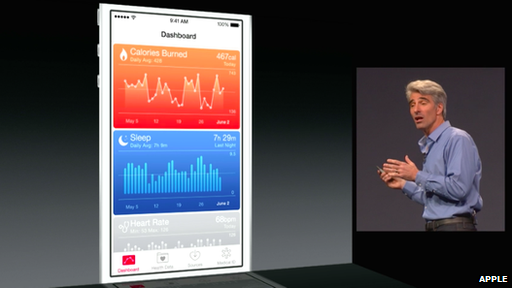
Apple's Health app can be set to call a hospital if an associated device detects a problem
iCloud Drive allows users to save any type of file on the firm's remote servers and then access it via an iOS device, Mac computer or Windows PC.
Users do not have to pay an extra fee unless they want use more than five gigabytes of storage.
That is more than Dropbox's 2GB sign-up allowance, but less than Google Drive's 15GB provision, Microsoft One Drive's 7GB limit and Box's 10GB cap.
Apple's service includes the ability to email attachments of up to 5GB via an internet link, something also offered by Dropbox and HighTail - a specialist data-sharing facility.
However, Apple made no mention of iCloud Drive being accessible via Android, unlike the other services that offer apps via Google's Play store.
"iCloud drive [is a] big shot at consumer Dropbox, if it works well," tweeted Benedict Evans, external, an analyst at venture capital firm Andreessen Horowitz - a nod to the fact that Apple has faced problems with its online services in the past.
Former chief executive Steve Jobs had previously attempted to buy Dropbox, reportedly warning its founders, external that he intended to go after the same market when they refused.
Automated homes
The latest version of Apple's operating system for desktops and laptops, entitled OS X 10.10 Yosemite, features a flattened design, and closer integration with other Apple devices, allowing users to make and receive calls and text messages from their iPhone on their desktops or laptops.
Like its predecessor, Mavericks, OS X Yosemite will be made available as a free update to existing Mac users.
Apple boss Tim Cook also showcased the tech giant's forthcoming mobile operating system, iOS 8, and emphasised cross-device integration. One feature, Handoff, allows users to start a task on one device and instantly pick it up on another.
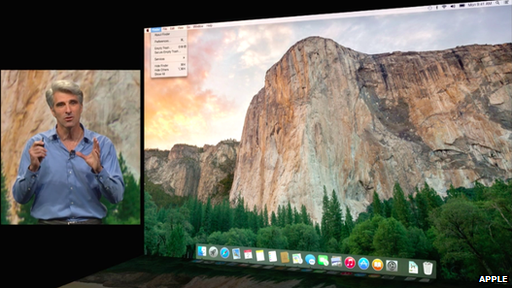
Apple has named the latest version of its Mac OS after Yosemite National Park
Apple's software engineering vice-president, Craig Federighi, also unveiled HomeKit, which allows users to control their home environment with smartphones.
"Only your iPhone can open your garage door, or unlock your door," he told the audience in San Francisco.
"With Siri integration you can say something like 'get ready for bed' and be assured that your garage door is closed, your door is locked, the thermostat is lowered and your lights are dimmed."

Analysis: Richard Taylor, BBC North America technology correspondent
Today's non-announcements of much-rumoured products like an "iWatch" will disappoint those who had hoped for the "amazing and exciting" new devices that Apple boss Tim Cook has promised this year.
But in truth this conference was always going to be about software rather than new devices; the Cupertino-based firm will leave those to the Autumn in time for the holiday season spending spree.
As predicted Apple is at least dipping its toes into new waters. If the health-centric features are well-executed, and can reconcile the various methods used by fitness band makers to measure our vitals, then it could indeed prove a powerful one-stop shop for this information. The big unknown: does it presage the introduction of Apple's own biometric-sensor wristwatch?
Similarly the HomeKit is a welcome attempt to unify the multitude of smart devices beginning to appear in our homes - but here precious little detail was forthcoming.
As people increasingly use multiple devices - laptops, tablets and smartphones - much of the focus was predictably on streamlining the user experience between them. Amongst the many enhancements were some genuinely exciting innovations - like making or receiving phone calls on any nearby Apple device.
But other "innovations" will already be somewhat familiar to Android smartphone users - like iCloud Drive, predictive text and the ability to use different keyboards. Apple will hope that its painstaking attention to design and usability will give it an edge, and buy it some time to win over industry-watchers anxiously waiting for Tim Cook to deliver on "the next big thing".

Fingerprint access
Apple also announced it would open up its Touch ID fingerprint recognition technology to third-party software developers - allowing device owners to avoid having to type in passwords - and let users install alternative keyboards including Nuance's Swype.
Lea Simpson, strategy director at digital agency TH_NK, told the BBC this year's conference "feels like the most 'open' Apple has ever been in both content and tone," as it announced integration with outside partners.
For example, the Health app will integrate data from Nike and other firms' fitness apps, and the tech firm is also working with medical care company Mayo Clinic in the US and NHS Cambridge University Trust in the UK.
Last week, Apple announced it was buying headphone maker and music streaming service Beats for $3bn - the company's biggest acquisition to date.
No further details on the Beats deal were revealed, but co-founder and hip-hop star Dr Dre did make an appearance as a caller in a demonstration of how a Mac computer can now be used to make and receive calls if it is linked to the owner's iPhone.
Apple shares, which have been doing well recently, closed about 0.7% lower on the day.
- Published29 May 2014
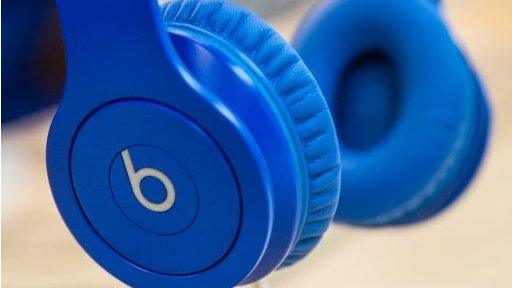
- Published23 April 2014
